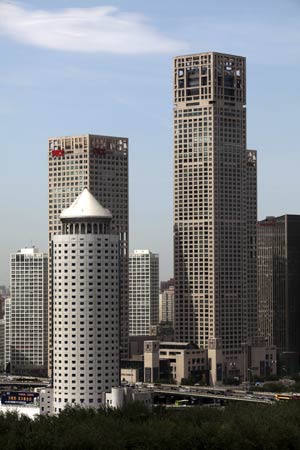Economy
Office vacancies in Beijing hit 20-year low
Updated: 2011-07-13 10:43
By Hu Yuanyuan (China Daily)
Domestic, multinational firms' expansions cut real estate supplies
 |
|
According to Savills PLC, Beijing's Grade A office vacancy rate in the second quarter fell by 2 percentage points quarter-on-quarter to 5.9 percent. [Photo/China Daily] |
The overall vacancy rate declined 2.6 percentage points quarter-on-quarter to 8.3 percent, with the Central Business District experiencing the largest decline, according to international real estate service provider Jones Lang LaSalle (JLL).
"The expansion of multinational companies' operations and domestic firms' leasing of multiple floors were the key drivers of demand," said Qin Xiaomei, chief researcher at JLL Beijing.
Demand for self-use space, which is owned by the tenant rather than renting, has remained strong. It accounted for nearly 40 percent of all net absorption in the first half of 2011, particularly from domestic firms and increasingly from multinational corporations.
JLL's findings were confirmed by another major real estate service provider. According to Savills PLC, Beijing's Grade A office vacancy rate in the second quarter fell by 2 percentage points quarter-on-quarter to 5.9 percent, while rents increased 12.6 percent to an average of 241 yuan ($37.20) a square meter.
Shortages of space available for rent are expected to enhance landlords' bargaining power in the coming quarters, resulting in further rent hikes, Savills said in a report.
According to Julien Zhang, managing director of JLL Beijing, the capital's overall rents are on pace to surpass those of Shanghai within four years.
"We are seeing companies taking a serious look at pre-leasing significant blocks of space for the first time in Beijing," said Zhang.
Driven by soaring rents of Grade A office space and the expansion of domestic and multinational companies, the purchase of prime office buildings, either for self-use or as a long-term investment, has been a primary strategy of cash-rich State-owned enterprises.
Major transactions in the second quarter include PICC Insurance Group's acquisition of one tower of Chaoyang Plaza and Bank of China Co Ltd's purchase of Xidanhui Plaza.
Foreign institutional investors are targeting offices in first-tier cities and commercial properties in second-tier cities.
"Most capital (for property investment) now is circulating within the Asia-Pacific area, and China remains number one in terms of the source of the capital and the target for property investment," Steve Williams, global advisor of Real Capital Analytics Inc, said earlier this month at a Royal Institution of Chartered Surveyors forum in Beijing.
Cross-border acquisitions of offices, hotels and retail properties rose by 30 percent to $4.8 billion in the first quarter, according to Real Capital Analytics. Among the top 25 real estate deals by value in the Asia-Pacific region, 15 were conducted in China.
According to David Hand, China investment head at JLL, average market yields may fall slightly or remain stable at best, as strong rental growth translates into even stronger capital value increases.
"We see no letup in this trend for the foreseeable future, thus making Beijing a truly compelling investment market," said Hand.

Specials

90th anniversary of the CPC
The Party has been leading the country and people to prosperity.

The write stuff
'Pen capital' goes back to drawing board for answers to economic changes taking shape in Zhejiang

Say hello to hi panda
An unusual panda is the rising star in Europe's fashion circles